- Home
- Ashley Poston
Heart of Iron Page 3
Heart of Iron Read online
Page 3
A voxcollar.
She’d only seen them on prisoners in Cercian mines to keep them silent, to stop them from inciting a rebellion. Why were they on the Valerios’ waitstaff?
The waiter gave a long, slow blink. He looked about her height.
She slid her burgundy coat back to reveal her pistol. “Sorry, but I’m going to need your clothes.”
Ana finished tucking the crimson dress shirt and bib into too-loose pants and swirled her hair up into a bun. She figured they had twenty minutes before someone found the waiter they’d locked in the pantry—she hoped, at least. He couldn’t scream with that voxcollar on unless he wanted a thousand volts of electricity straight to the neck.
She grabbed the tray of champagne flutes as she left the kitchen and hoisted it onto her shoulder. Di waited for her at the top of the stairs, the curtain of honeysuckle vines a vivid green and yellow against his still frame.
In the garden, Ironbloods chatted to one another from behind delicately laced fans and white-gloved hands, their pleasant smiles like masks.
To hide all the rot underneath, Ana thought bitterly as she searched for that damned Ironblood in the crowd. It didn’t help that she’d barely gotten a good look at him. Sharp jaw, crooked smile. Goddess, all the men looked the same in their starched evening coats the rich color of flowers, accented with brassy buttons and family insignias. Jesper. Carnelian. Malachite. Umbal. Wysteria. Valerio . . .
It was a viper den.
She pursed her lips before finally saying, “I think you should stay in here and look for the Ironblood underground. He could try to give me the slip.”
“He does not even know we are here, and I will be of more assistance to you in the garden. I could pose as a Messier.”
“And what’s the chance of you glitching again soon?”
He did not respond for a long moment. “Seventy-four-point-six percent.”
“It’s getting too high,” she said softly. “Don’t be difficult, please.”
“I am being pragmatic. It is a large party and—”
She turned around and grabbed ahold of his hands, looking up into his moonlit eyes with all the conviction she had.
“I’ll be fine,” she said. She genuinely believed it, too. “You know I won’t get into trouble without my best friend.”
“That is not as reassuring as you may believe.”
She squeezed his hands tightly, even though he couldn’t feel it. “I’ll always come back for you,” she whispered, reaching up on her tiptoes to press her forehead against his cool metal one. “I promise you on iron and stars.”
She wanted him to promise, too—but she knew he wouldn’t.
Metals didn’t have emotions, so how could she love something that would never—could never—feel the same? She often told herself, when her heart fluttered or her cheeks burned, that she didn’t love him.
That she couldn’t.
But, every time she tried to picture herself without him, there was only a great darkness in her head. She didn’t know who she would be without him, and she never wanted to know. Her heart beat, and his wires hummed, and they were Ana and Di—and there were no words for that.
So she pressed her lips, briefly, against his metal mouth, and whisked herself out through the vines and into the party.
Goddess, she needed fresh air.
D09
A kiss.
One-point-three seconds—and gone.
He touched his metal mouth even though he could not feel—neither physical touch nor emotional. Ana had never kissed him on the mouth before. On the cheek, yes, when she’d drunk too much of Wick’s Cercian ale. But never on the mouth. Her words echoed through his processors like a virus.
I’ll always come back for you. I promise you on iron and stars.
It was more than a promise—it was an oath. Unbreakable. Strong like iron and steady like stars.
It was said that such promises could never be broken; the Goddess would not allow it. The probability of a supernatural binding was less than one percent, but the vow stuck with him all the same.
Because Ana had never promised on iron and stars before.
The Ironbloods did not notice as she passed into the party. They laughed among themselves, leaning against statues of the Goddess, her marble gown flowing freely in a stone-petrified breeze. The Goddess always looked up. He recalled how Ana hated that. But if she looked down, she would have seen men and women sipping on rose-scented champagne, oblivious of the poor living below this floating garden.
The Ironbloods were too self-absorbed to notice Ana as she waded between them, deeper into the garden.
He watched her for 7.3 seconds longer—until a signal pinged his processors. It was faint, easily hidden under the garden’s security radio chatter. Could it be the HIVE? He had never picked up the HIVE’s frequency before. Only Messiers could.
The signal began to grow louder.
Easing down the stairwell again, he pressed himself against the wall and sank into a shadowy corner between the kitchen and the hallway.
An older man, graying beard braided down his chest, appeared at the far end of the hallway. Dark eyes and deep wrinkles and ghostly-pale skin. The clank of decorative medals on his breast accompanied his footsteps. He was dressed in a simple royal-purple evening coat with uneven tails, gilded buttons and filigree across the collar and sleeves. He carried with him a thin piece of glass with scrolling data—a holo-pad—that illuminated the hallway as he walked.
Di recognized the man from countless newsfeeds and history books.
Lord Rasovant. The creator of Metals.
D09 had never seen him in person before, at least never a time his damaged memory core could recall, and it could not recall anything from before the Dossier.
The strange signal was so close now, bouncing off the steel walls like ricocheting bullets.
“Then find those coordinates,” the older man stressed in a sharp tone. “Surely one of the Messiers managed to get their faces.”
“As luck would have it, they did not,” replied the girl who trailed behind him. She walked with the grace of a dancer, floating without a sound. The pins in her flaxen hair matched her black dress. Floor-length, high collar, the insignia of the crown on her sleeve. She was a royal servant, and yet she spoke so informally to him that Di thought it strange. “Rasovant, this ship is not worth our time.”
The Iron Adviser stopped in the middle of the hallway and turned back to her. “Mercer stole that ship, and I want it back. Find it. Do whatever is necessary.”
“Whatever necessary?” The signal turned sharp and grating. It made D09 shudder, rattling his code. “Are you sure?”
“Yes, Mellifare,” Lord Rasovant replied.
This was not part of the plan. If Rasovant was looking for his own fleetship, then Di would let him find it—without interferrence. This was not worth the trouble it entailed, and he had promised Siege to keep Ana safe. This was not, in any definition of the word, safe.
Finding a way to fix his memory core was not worth Ana’s life.
The servant girl, Mellifare, smiled. “My pleasure—”
From the far end of the hallway came a guard, clad in the royal purples of the crown. A Royal Guard. If the Royal Guard were here, then so was the Grand Duchess. The odds of him or Ana escaping decreased by the moment.
“My lord, a moment,” said the guard. She was tall, with white-blond hair and arrowhead-shaped markings under her eyes—heritage markings for certain Cercian clans. The woman must have been from one of the few Cercian Ironblood families, as only Ironbloods could join the Royal Guard.
“Royal Captain Viera,” the Adviser greeted her. “What can I do for you?”
“There may have been a breach in security,” Viera replied, a hand resting on the lightsword at her hip. She was young to be the Royal Captain. Eighteen. If not for the Plague that had decimated an entire generation twenty years ago, he doubted she would be in such a position.
; “A breach?” asked the Iron Adviser.
“Yes, a waiter was found tied up in the pantry without clothes. We believe we have an imposter in the garden, and the Grand Duchess is not safe. Should I notify her or—”
“That will not be necessary. I will tell the Messiers to assist you so you can deal with this quietly.”
“I don’t need their assistance, my lord—”
“Of course you do, Captain. Messiers are here to protect, after all.”
“Yes, sir,” replied the Royal Captain, trying to disguise the downturn of her mouth as she gave another low bow and left.
If the guards found Ana in the garden, she could not fend them off alone—and there was a 93.7 percent chance that she would fight. She did not know how not to.
The signal spiked again, tugging at his code. D09 jerked—and his metal elbow hit the wall with a resounding ding.
Rasovant’s assistant snapped her gaze over. Her eyes narrowed.
D09 went rigid as he raised firewalls against the signal. Another glitch picked at his code, pulling like kite strings.
“Is something the matter?” asked Lord Rasovant.
The young woman shook her head. “Nothing important. Let us go—the Grand Duchess should be announcing her heir soon. . . .” She grabbed her elder by the hand and tugged him along the hallway. She did not look back.
The spiking signal faded, until only an echo remained.
He sank to his knees, twitching as his programming righted itself again. If that assistant saw him, why did she not say so? The glitch tugging at his processors ebbed, giving him access to his own functions again.
“Jax?” He sent out a comm-link to the skysailer. There was no answer for a moment, and then—
“Messier. Stupid—gotta—trying hard—marina!”
That did not bode well.
Rerouting his energy to his legs, he got to his feet. He would not glitch. Not now. Not yet.
He must find Ana.
Robb
The cityscape of Nevaeh passed below, a grid of grimy, dilapidated buildings.
Nevaeh had been the only safe haven from the Plague twenty years ago, so everyone who was not infected had moved here—including Ironbloods, who created the gardens to separate themselves from the citizens. An extra layer of protection from the Plague. But soon the space station fell into disarray, with too many citizens and too little space and no money left to buy land on-world on Eros or Iliad after the Plague was eradicated.
At least the view from the floating garden was still beautiful, he reasoned, as he rotated the piece of iron ore his father had given him between his hands. It was an old habit, and he always felt closer to his father when he did it. The ore rusted in his grip.
His father had given it to him the night he’d left for the Iron Palace seven years ago, mere hours before the Rebellion, when the palace’s North Tower went up in flames. The fire killed the royal family and—as rumors went—his father as well.
“Keep it safe until I get back, son,” his father had said. Robb still remembered the way he looked in the light that leaked through the cracked doorway into his room, thick beard and blue eyes and a lightsword on his back. “Don’t let anyone know you have it. I’ll be back by morning.”
Then he’d kissed Robb’s forehead and was gone into the night.
It was the last time Robb ever saw him.
In the seven years since, Robb still couldn’t puzzle out why his father had given him a rock, reminding him every day of what he was not. It was a piece of the same iron that made the crown, and like the crown, it rusted for everyone who touched it. Except those chosen by the Goddess to lead the kingdom. For the last thousand years that had been the Armorov bloodline, until they died in the Rebellion.
Would it rust for his brother, a Valerio?
Would it even matter?
Erik was the next in line, despite not being of Armorov blood. The Valerios were related to the Armorovs by marriage—their late aunt had married the late Emperor. But when they died in the Rebellion, the Grand Duchess became the interim ruler until the Moon Goddess chose another Emperor.
The Moon Goddess never did.
So now, what alternative did the kingdom have other than Erik Valerio? Besides, the other side of the Armorov bloodline, the Aragons, had gone reclusive after they’d lost their only daughter to outlaws.
Emperor Erik. The title made Robb sick.
The Valerio family was the wealthiest in the kingdom and ruled over twenty-three districts on Eros and Iliad, and a mining continent on Cerces, so they were expected to present themselves with a certain flair—especially at parties.
He straightened his vintage blue evening coat—it was his favorite, but after that altercation in the shrine there was a tear at the elbow. He hoped the flowers covered up the stench from the back alley of Nevaeh and no one would pay attention to the scratch on his cheek. He smoothed back his brown curly hair and took a calming breath.
“Please remove that unpleasant look from your face, darling, people are watching,” said an arsenic-and-honey voice.
Robb jumped, almost dropping the ore. He quickly pocketed it, rubbing the rust off on his dark trousers.
His mother came to rest against the railing beside him, her tea-length crimson dress, diamonds sewn into the lace, glittering like a bloodred sky.
“Was it too much to ask for you to be on time to a party for once?” she asked.
“Forgive me, Mother,” he said with a short bow. “I lost track of time.”
“And where were you this time? The horse races? A gambling den?”
“A shrine.”
She waved her hand dismissively. “The less I know about whatever you do these days, the less I’ll dislike. But you can at least be present at your brother’s celebration,” she added after a moment, pursing her red lips. “Your brother will be named heir to the Iron Throne—”
And crowned on the thousand-year anniversary of the Iron Kingdom, on the morning the three planets of Eros, Iliad, and Cerces aligned—Holy Conjunction—as if his brother could get any more insufferable.
The coronation next week couldn’t come fast enough.
“—and you need to start acting like the head of this family,” his mother finished.
The words made him pause. Feel nauseous. “Forgive me, what?”
“It’s only natural when the new Emperor takes the crown that he abdicates all family ties, and as the Goddess must have foreseen,” she said with an air of bitterness, “I have a second son.”
Robb bit the inside of his cheek before he could say anything he regretted. He wasn’t like his brother. At nineteen, Erik Valerio was dashing, popular, and conniving in a way that granted him whatever he wanted. He looked like their mother—tall and olive skinned, a sharp face, with straight dark hair and a smile that made you want to trust him. He was made to lead.
And as the second son, Robb never thought he would amount to much. He looked the most like their father, broad shouldered and stocky, with hair that curled like the lies that fell from his tongue.
Goddess save him, the head of the Valerio family?
That was his father’s position. His father’s title. Not his.
“Right, of course. Naturally.” He turned to flag down a waiter for a glass of champagne. “The rose blend,” he began—and paused.
The waiter wore a black collar around his neck. A voxcollar. Robb tried to keep his face placid, even though the sight of one of those horrible things made his blood boil. His grandfather had created them to control the prisoners on Cerces, but taking away one’s voice was a punishment no one should endure.
“Oh yes, I’ve been wanting to try that one—make it two,” added his mother, and the waiter bowed and left. Then she frowned. “I would much prefer Messiers at our next engagement. They do not gossip. I’m sure Lord Rasovant would let us borrow a few.”
“Is that why we’re using voxcollars on our employees?” he asked, keeping his voice level. To keep them fro
m gossiping?
“Do you disagree with my choices?” his mother asked, narrowing her eyes. “Voxcollars keep my employees loyal.”
“Humans can’t be HIVE’d, Mother—”
“No but they can be quiet. As Valerios, we need to be mindful of what people say, especially once our Erik takes the throne.”
Because if word got out that the crown rusted for Erik Valerio, his legitimacy would be questioned, and instead of finding someone the crown didn’t rust for—including a citizen not of the nobility—the Ironbloods would rather choose their own. It was easier to control a kingdom that way.
But if he said as much to his mother, he wouldn’t have a tongue.
“And once he does take the throne,” she went on, “I will see to it that the Academy will forgive your prior misdeeds and welcome you back. I cannot have an uneducated son running my family.”
Prior misdeeds, as if his failures were simply part of a laundry list to be expunged, like every other smear on the family.
He pushed himself off the railing. “Excuse me, Mother, I think I hear my name being—”
She took his right wrist and pressed into the thin flesh to grind the tracking chip into the bone.
He sucked in a painful breath.
“I know you are still searching for him, Robbert,” she said, her eyes more steel than blue, marbles behind kohl lashes. “You will put an end to these heedless fantasies. Your father is dead, and we have a legacy to pursue. Toriean el agh Lothorne”—their family’s motto, carved into every crest and every insignia with their name—“Glory in the Pursuit. Understand that. Be the man your father couldn’t, or you will ruin us all.”
She pressed for a moment longer, grinding, grinding, thumb digging into his skin, before she released him.
He drew his arm away quickly, rubbing the tender flesh. He couldn’t meet her icy eyes. The tracking chip had been a precaution years ago, implanted permanently into both of her sons so she’d never lose her family again.
At least that was what she’d told them.

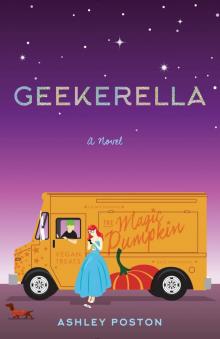 Geekerella
Geekerella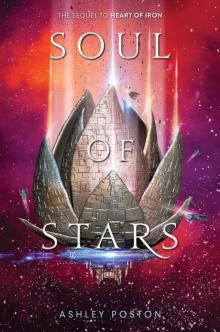 Soul of Stars
Soul of Stars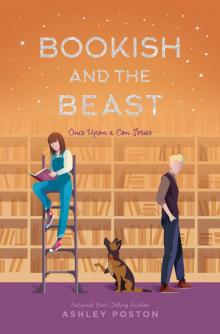 Bookish and the Beast
Bookish and the Beast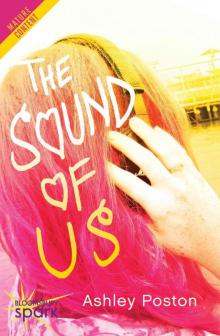 The Sound of Us
The Sound of Us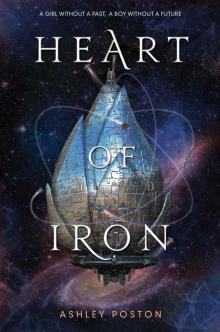 Heart of Iron
Heart of Iron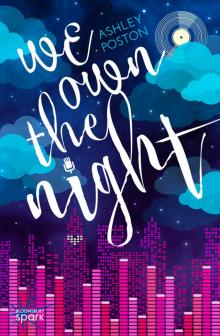 We Own the Night
We Own the Night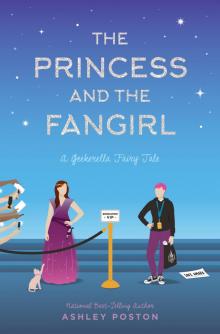 The Princess and the Fangirl
The Princess and the Fangirl